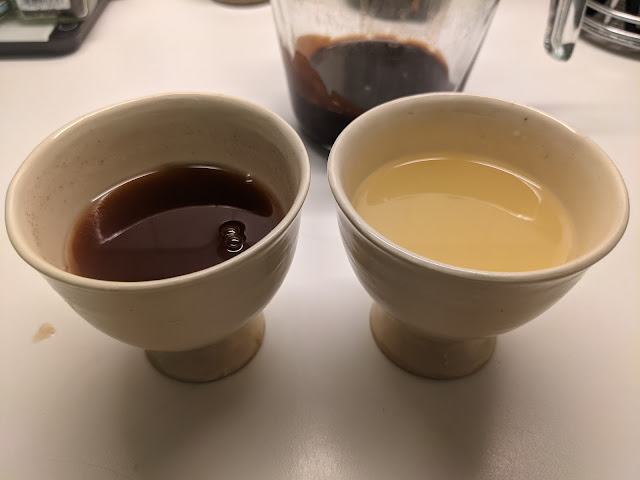I'm translating a book!
Picking this blog back up after a looong time...
One of my brewing interests is historical alcohol. I got pretty inspired by Magnus Hvalmagi's blog investigating viking-era Norse beer, which I had a swing at and was delicious, and between that and my interests in Chinese, I've been looking for alcohol recipes in old texts for a while.
How I found this is a story for another time, but I came across the Qimin Yaoshu (齊民要術), a sixth-century CE farm manual whose name means something like
"essential techniques for the welfare of the people." It's pretty long, and is cut into about 10 scrolls, which have about 8 or so "chapters" each. Each chapter has a title, but I think the scroll divisions are arbitrary. The best part is that the entire text is available on wikisource.
It's pretty easy to read using my weak knowledge of literary Chinese and the dictionaries I have access to, I think mostly because it's a pretty dry technical manual and isn't trying to be cute or clever. I'm going to post translations of chapters as I do them, so here's the first. Chinese and especially literary Chinese is much less dense than English, so some of these sentences expand quite a bit. I believe that the red text is annotations or some kind of other correction on the original by later editors, so I've left it and my translations of it red.
Before we get to actual alcohol production, we need to know some things about what you put your alcohol in, apparently:
One of my brewing interests is historical alcohol. I got pretty inspired by Magnus Hvalmagi's blog investigating viking-era Norse beer, which I had a swing at and was delicious, and between that and my interests in Chinese, I've been looking for alcohol recipes in old texts for a while.
How I found this is a story for another time, but I came across the Qimin Yaoshu (齊民要術), a sixth-century CE farm manual whose name means something like
"essential techniques for the welfare of the people." It's pretty long, and is cut into about 10 scrolls, which have about 8 or so "chapters" each. Each chapter has a title, but I think the scroll divisions are arbitrary. The best part is that the entire text is available on wikisource.
It's pretty easy to read using my weak knowledge of literary Chinese and the dictionaries I have access to, I think mostly because it's a pretty dry technical manual and isn't trying to be cute or clever. I'm going to post translations of chapters as I do them, so here's the first. Chinese and especially literary Chinese is much less dense than English, so some of these sentences expand quite a bit. I believe that the red text is annotations or some kind of other correction on the original by later editors, so I've left it and my translations of it red.
Before we get to actual alcohol production, we need to know some things about what you put your alcohol in, apparently:
塗甕第六十三 Chapter 63: Sealing Weng [A common urn or amphora-like vessel]
凡甕,七月坯為上,八月為次,餘月為下。In general, for weng, the unfinished ones from the 7th month are the best, those from the 8th month are second, and those from other months are the worst.
凡甕,無問大小,皆須塗治;甕津則造百物皆惡,悉不成,所以特宜留意。In general, weng, without question of size, all must be thoroughly smeared [with fat]; if they’re wet, then they’ll make everything awful, because they’re unfinished - therefore, you should be especially careful. 新出窯及熱脂塗者,大良。The kind that has had heated animal fat spread over it just after it has left the kiln is excellent. 若市買者,先宜塗治,勿便盛水。If they’ve been bought in a market, you must first smear it [with fat] - do not simply put water into it. 〈未塗遇雨,亦惡。If they’re rained on without having been smeared yet, they’re also ruined.〉 塗法:掘地為小圓坑,〈旁開兩道,以引風火。〉Here’s how to seal them: dig a small round trench in the ground, 〈open two paths, to guide in air for the fire.〉 生炭火於坑中,合甕口於坑上而熏之。Light fresh charcoal [wood?] in the middle of the trench, and fit the mouth of the weng over the top of the trench so that it may be smoked. 〈火盛喜破,微則難熱,務令調適乃佳。If the fire is exuberant, it will happily waste fuel, if it’s too small then it will hardly heat it, so make an effort to adjust the fire and all will be good. 〉數數以手摸之,熱灼人手,便下。Judge using your hand to feel it, and if it burns your hand then lower it [the fire]. 瀉熱脂於甕中,迴轉濁流,極令周匝;脂不復滲〈所蔭切〉,乃止。Pour hot fat into the weng, rotating it to cause turbulence, and quickly cause it to flow all the way around; when the fat no longer oozes 〈that which shields it from contact with the sides〉 then stop.〈牛羊脂為第一好,豬脂亦得。Cow and sheep fat are the best, pig fat also works. 俗人用麻子脂者,誤人耳。The common people use hemp seed oil, which is nothing but fooling people. 若脂不濁流,直一遍拭之,亦不免津。If your fat does not flow turbidly, just wipe it off once, for it will inevitably become wet. 俗人釜上蒸甕者,水氣,亦不佳。The common people steam their weng on top of a caulrdon, the steam, is also not good. 〉 以熱湯數斗著甕中,滌盪疏洗之,瀉卻;滿盛冷水。Take some boiling water and several dou [of grain]. add them to the weng, and scour it. 數日,便中用。After several days, you may use it at your convenience. 〈用時更洗淨,日曝令乾。When you use it, wash it clean again, and let it dry in the sun.〉
I think this is pretty interesting - describing what seems to me to be seasoning the weng before using it. Anyone know how clay pots for cooking are seasoned today?
I think this is pretty interesting - describing what seems to me to be seasoning the weng before using it. Anyone know how clay pots for cooking are seasoned today?


Comments
Post a Comment